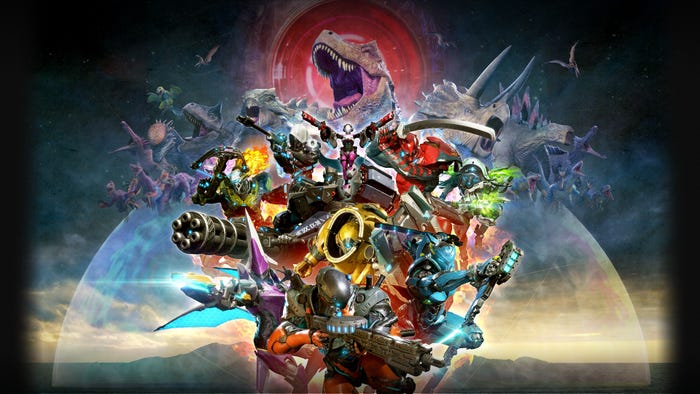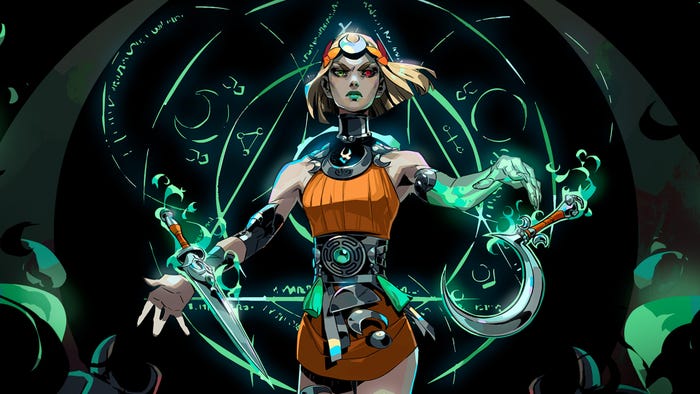
Featured Blog | This community-written post highlights the best of what the game industry has to offer. Read more like it on the Game Developer Blogs.
From the Perspective of Play
My thoughts about the importance of a ludological focus within video games to enhance the experience of play.

My inspiration for this post has to be credited to Taekwan Kim at Gamasutra in his post Breaking Skyrim. He basically discusses the unique flavour of the perk and levelling system within the game, which I'll not go into too much detail about here.
I wanted to focus today's ramblings around ludism, and I think it is only fair to explain what I mean by that term. It basically concerns the 'play' aspect within a game space. Emphasis within a game is usually separated between ludological intricacies and on the narrative impact of plot and character development. You generally find that one of these elements will receive more attention.
Most multiplayer elements of video games are purely ludological, in that they require no back story, and often have no real reason to have you running around. This is particularly apparent in first-person shooters. Not to say that they lack of an experience because of this. Simply put, they are all about the doing rather than the why.
Single player experiences generally require some tangible narrative in order to pull you through the game. Even in open world titles there needs to be a central drive in order to make you want to explore the world. Not only that, but the character you are playing as needs to be engaging, either as a reflection of your own preferences, like in RPGs, or a character that acts as an alter-ego for your normal personality. In the latter case, it requires heavy work on the part of the developer to make the player want to be this character for the duration of play.
Recently, in titles like Star Wars: The Force Unleashed and Infamous this has meant overpowering the character to the ultimate badass. So, in sticking with single player, it might seem as if the narrative overcomes the need for engrossing play mechanics, but that would be facing in completely the wrong direction.
Games with strong narrative and deep characters require even more work on the play design. There is nothing more jarring than a game that has a rich story, only to be jolted out of that tale by a clunky control scheme, or the play elements being sparse in comparison to cut-scenes and quick-time events.
People play games for exactly that reason; to play. I've seen a few recent titles heading in the direction of Hollywood envy. By this I mean that they are going down the road of film-like dramatics. I'm thinking along the lines of the recent Call of Duty titles. They try hard to imitate an interactive movie, in which you feel like the lead character. They also pay close attention to making the player feel like the character and not an actor getting into character. This works fine in terms of immersion, but it doesn't provide much room for a gamer to explore the world they are investing hours in.
I'm not by any means saying that all games should be open world at all, but I feel that people trudge through cinematic scenes of awe and wonder, and bolt from location to location when shit gets heavy, but don't ever find the time to establish a connection to the virtual environment that this all takes place in. It becomes more of an adrenaline rush than a rich gaming experience.
Play then, is as much about the player as the game world from the perspective of the developers. When a person invests their time into a game world, they are helping that game to reach it's potential. They are commanding elements of the game to function to their specific requirements. The more control given to the player for this purpose, the deeper the experience that one has.
Surprisingly, RPGs often miss the mark with this when they misuse the levelling system in their games. It's becoming more popular to incorporate smart attribute levellers. This effectively takes control away from the player to use the attributes they want, and I'll explain. By automatically levelling up an attribute, and leaving the other attributes by the way side (due to lack of use), it prevents a player changing their mind later on, when opponents are high level and difficult to beat with the nurtured attributes. It is almost like telling a player that their attributes will level up the more they use them, but the ones they don't use much to begin with will become obsolete a fair way through the game as they'll be completely ineffective against your enemies.
The new Elder Scrolls: Skyrim, does incorporate this system. They did however, put a lot of time into refining it so that it was possible to level these up even in the later stages of the game. For example, as Kim said in his article (mentioned at the top) the attributes can interweave with eachother, meaning that the prolific use of, say, conjuration can bind weapons to make them more powerful, in which case, a low archery rating might be rectified until that rating increases higher. Substituting points in this way makes surviving much more doable, regardless of your chosen path. This is also made possible through the varied levelling up rates of the enemies as well. Some enemies will always be a bitch to destroy (like blood dragons and giants), where as the likes of wolves are a piece of piss after around level 7. This means that you can use your weakest attributes against them and still make progress.
Interaction with other characters is also a biggy! I liked the interaction system in Mass Effect 2 because, not only did it bring an emotional connection to the table, but how you responded to each of your team often had an effect on how others reacted to you. Your interaction with people throughout the galaxy had an effect on your team mates' perspectives of you as well. If you were the ultimate asshole to hard done by people, the angels in your team would see you for the raging dick you are, whilst those without a sense of morality wouldn't give a crap, and might actually think better of you.
So considering these two different elements, I think it's important to note that they exist cohesively with the narratives. Interaction with others relies on the narrative of those others. If they have no personality or emotional impact on your experience, then it's clearly trousers to a fish as to how they react to your actions, unless you are particularly concerned with what other people think of you in a made up world. If the characters around you feel real, and engage with you on a deeper level, rather than spouting random words at you from time to time, it begins to matter to you more how you act, whether you decide to push against that connection, or embrace it and make changes to how you operate.
Furthermore, a levelling system that reflects the ever changing focus of the human mind is important. But it becomes more important when narrative elements give you opportunities to use those new found strengths for something that matters. If you levelled up your archery to the maximum, with only targets to shoot at, it would negate any reason.
To sum up then, play is important for any game environment. If we as players are not given certain freedoms to experiment and explore the foundations of the games we play, then the connection to that game is damaged, and the emphasis of the player turns towards completing it and moving swiftly on to another title.
It is promising that high profile titles are starting to move back towards allowing game players to have more control. Games like LittleBig Planet; where the idea is to use the tools given to you to go crazy and be creative, are a breathe of fresh air in a shooter heavy industry. They set a standard for other developers to see and raise the bar for ludological interaction. The way we interact with the game world has, arguably, a bigger impact on how immersed a player is in a game, and no amount of narrative genius can make a good game if there's no depth to the play.
About the Author(s)
You May Also Like













